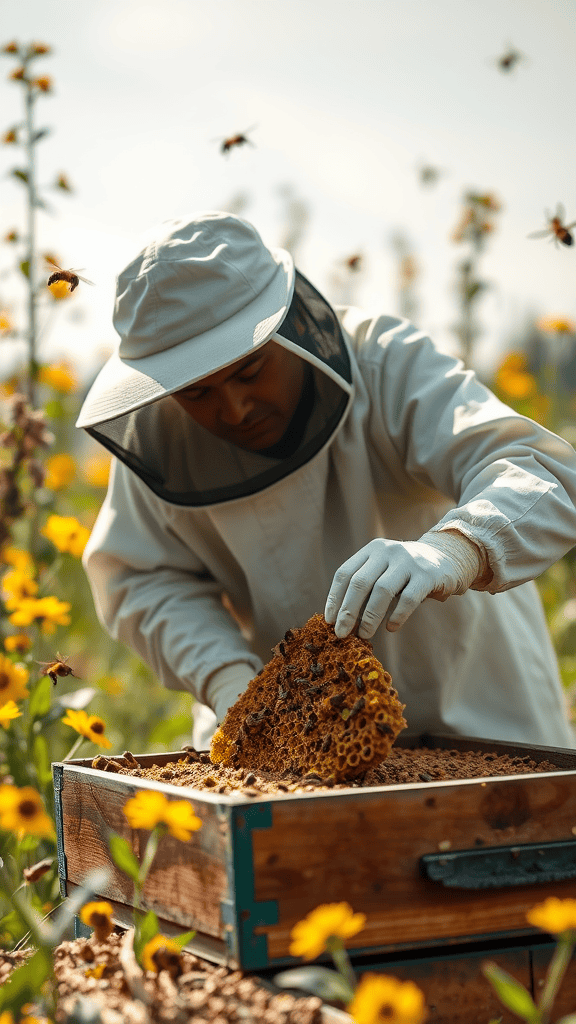Effective Techniques on How to Practice Natural Beekeeping
Natural beekeeping is a sustainable and respectful approach to managing honeybee populations. This method prioritizes the health and welfare of bees over maximal honey production. If you’re eager to explore how to practice natural beekeeping, there are several effective techniques you can embrace.
Understanding Bee Behavior
To start your natural beekeeping journey, it’s essential to understand bee behavior. Knowing how bees live and operate will help you manage hives more effectively. Here are a few key points:
- Swarming: Bees naturally swarm to reproduce and establish new colonies. This is a critical aspect of their life cycle and should be respected.
- Colony Dynamics: Each bee has a specific role, from the queen to the worker bees. Understanding these roles can help you create a thriving environment.
- Communication: Bees communicate through pheromones and dances. Observing their behaviors will give you insights into their needs.
Choosing the Right Hive
Selecting a hive type is crucial for natural beekeeping. Consider these hive options:
- Top Bar Hives: These allow bees to build their comb naturally. They are easier for beekeepers to manage while promoting bee health.
- Warre Hives: A vertical design mimicking a tree, these hives encourage a more natural nesting behavior.
- Langstroth Hives: If you prefer a traditional option, these are popular but should be used with a focus on bee welfare.
Improving Hive Management
Effective hive management is at the heart of natural beekeeping. Focus on these techniques:
- Avoiding Chemicals: Steer clear of synthetic pesticides or treatments. Instead, use natural remedies to manage pests, such as essential oils or organic methods.
- Minimal Intervention: Let the bees work in their own way. Intervene only when necessary to ensure the colony’s health.
- Regular Inspections: Regularly check on your bees without causing stress. Look for signs of disease or pests to keep the colony healthy.
Providing Natural Nutrition
Your bees will thrive when they have access to diverse and natural food sources. Here are some tips:
- Plant Diverse Flora: Landscaping with a variety of plants that bloom at different times helps provide constant food sources throughout the year.
- Avoid Monocultures: Growing only one type of plant can limit bees’ diet and nutrition. Think of colorful flowers, fruit trees, and herbs.
- Supplement Feed Sparingly: If you need to feed your bees, use natural sugar syrups or pollen patties, but this should only be a temporary measure.
Promoting Biodiversity
A thriving ecosystem supports healthy bees. To enhance biodiversity:
- Encourage Wild Plants: Neglecting lawn maintenance to promote clover and dandelions can provide more foraging options.
- Plant Native Species: native plants helps attract local pollinators and promotes ecological balance.
- Birdhouses and Insect Hotels: Attracting other pollinators can help your garden sustain itself while providing variety for your bees.
Education and Community Involvement
Continuous learning is key to successful natural beekeeping. Engage with others who share your interests:
- Join Local Beekeeping Groups: Participating in local clubs or organizations can provide valuable insights and support.
- Attend Workshops: Hands-on experiences through classes can deepen your understanding of bee care.
- Share Knowledge: Sharing your experiences can foster community and innovate more ideas for sustainable beekeeping.
Practicing natural beekeeping is a fulfilling endeavor that enhances both the health of bees and your connection to nature. By understanding bee behavior, choosing the right hive, and implementing effective management techniques, you can play a significant role in the preservation of these vital pollinators. Embrace the journey, learn, and enjoy the sweet rewards of natural beekeeping.
Understanding the Benefits of Sustainable Beekeeping Practices
As the world increasingly recognizes the importance of bees for biodiversity and agriculture, it becomes crucial to embrace practices that promote the well-being of these essential creatures. Sustainable beekeeping focuses on methods that respect the natural behaviors of bees and protect the environment. Understanding the benefits of these practices can inspire beekeepers, farmers, and even hobbyists to adopt more responsible and effective strategies for managing bee populations.
One immediate benefit of sustainable beekeeping is enhanced bee health. By minimizing chemical use and focusing on organic methods, beekeepers can reduce the risk of exposure to harmful pesticides. This approach encourages the development of resilient bee colonies that thrive in their natural environment. Practices like regular inspections, monitoring for diseases, and implementing natural remedies when issues arise help ensure that bees remain healthy without compromising their environment.
Moreover, sustainable beekeeping practices foster biodiversity. By planting a variety of flowering plants and providing natural habitats, beekeepers can create ecosystems that support not only bees but also other beneficial insects. This balance is essential for maintaining healthy ecosystems and agricultural systems. When bees have access to a diverse range of food sources, they forage efficiently, leading to better honey production and pollination services.
Another significant advantage is the production of higher quality honey. Honeybees that gather nectar from a variety of flowers tend to produce more flavorful and nutrient-rich honey. This honey is often sought after in the market, allowing beekeepers to position themselves competitively. Sustainable practices can include ensuring that bees have access to organic flowers and preventing overharvesting of honey, thereby preserving bee populations while enhancing the quality of the products they offer.
Engaging with the community also becomes a strong point of sustainable beekeeping. Beekeepers who practice sustainability can educate the public about the importance of bees and the challenges they face. Hosting workshops or farm visits allows individuals to connect with nature and learn directly how their actions can impact bee populations. This grassroots movement helps to foster a sense of responsibility and environmental stewardship that can ripple through the community.
Practicing sustainable beekeeping also leads to economic benefits. As consumers become more environmentally conscious, they are willing to pay higher prices for products that align with sustainable practices. Beekeepers who utilize organic methods, focus on local sales, and market their honey as eco-friendly often find a loyal customer base. This shift toward sustainable consumption encourages a circular economy that can benefit not only individual beekeepers but also local communities.
- Minimizes Chemical Use: Reducing or eliminating pesticides and synthetic treatments protects both bees and the surrounding ecosystems.
- Promotes Hive Diversity: Utilizing various bee breeds can improve resilience against disease and environmental stressors.
- Enhances Soil Health: Practices like planting cover crops and using natural compost improve soil quality, benefiting plants that bees rely on.
- Encourages Local Pollination: Healthy bee populations support local agriculture, leading to increased crop yields and improved food security.
Sustainable beekeeping practices contribute significantly to climate resilience. As climate change leads to unpredictable weather patterns, bees with strong genetics and adaptive behaviors are crucial. Beekeepers who focus on sustainability are better equipped to adapt to these challenges, ensuring the survival of their hives in varying conditions.
Additionally, sustainable practices often involve greater engagement with natural cycles. By understanding the seasonal behaviors of bees and aligning management practices accordingly, beekeepers can work in harmony with nature rather than against it. This perspective not only aids in hive maintenance but also nurtures a deeper connection between the beekeeper and their surroundings.
Ultimately, the benefits of sustainable beekeeping practices extend beyond just the beekeepers themselves. By supporting healthy bee populations, these practices contribute to universal ecological balance, food security, and community connection. Whether you are an aspiring beekeeper or simply someone who cares for the environment, recognizing these interconnected benefits can inspire action to help protect and sustain our planet’s invaluable pollinators.
Conclusion
Practicing natural beekeeping offers a nurturing approach that not only benefits the bees but also the environment and local ecosystems. By adopting effective techniques, such as providing natural habitats and minimizing chemical use, you can create a healthier space for your bees to thrive. Encouraging biodiversity within your apiary, planting pollinator-friendly plants, and practicing swarm management are all essential skills that can enhance the well-being of your hive.
The long-term benefits of sustainable beekeeping practices extend far beyond your personal enjoyment as a beekeeper. Healthy bee colonies contribute significantly to pollination, which is vital for food production and biodiversity. By focusing your efforts on natural methods, you help preserve bee populations against threats such as pesticides, habitat loss, and disease. This commitment to sustainability not only supports the bees but also fosters a greater awareness of environmental issues in your community.
Your journey into natural beekeeping can be deeply rewarding, leading to a sense of connection with nature and a responsibility towards conservation. Each hive you care for becomes a living testament to a more harmonious relationship between humans and the environment. Whether you are a new enthusiast or an experienced apiarist, embracing these sustainable techniques empowers you to be a steward of nature and a protector of vital pollinators. As you continue to explore natural beekeeping, remember that every small action contributes to a larger movement that benefits us all, reminding us of the intricate dance between man and nature.
As an Amazon Associate, I earn from qualifying purchases.

